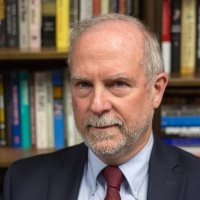Post Wall, Post Square: Rebuilding the World After 1989
This landmark global study makes us rethink what happened when the Cold War ended and our present era was born. The world changed dramatically as the Berlin Wall fell and protest turned to massacre in Tiananmen Square. With fresh documentation and deft analysis, Post Wall Post Square offers a bold new interpretation of 1989’s revolutionary upheavals and of how a new world order was forged around this duality. Enlivened by vivid human stories, Kristina Spohr offers an authoritative yet highly readable exploration of the crucial hinge years of 1989-1992 and their consequences for today’s world.
Kristina Spohr is the Helmut Schmidt Distinguished Professor at the Henry A. Kissinger Center for Global Affairs, Johns Hopkins University, Washington DC. She is also on the permanent faculty of the International History Department of the London School of Economics. German-Finnish by birth she studied at the University of East Anglia, Sciences Po Paris and Cambridge University where she subsequently also held a Junior Research Fellowship. Prior to joining LSE, she worked at NATO HQ in the Secretary General’s Private Office. She has authored and co-edited eight books, most recently The Global Chancellor: Helmut Schmidt and the Reshaping of the International Order (OUP, 2016) and Open Door: NATO and Euro-Atlantic Security After the Cold War (Brookings, 2019).
The Washington History Seminar is co-chaired by Eric Arnesen (George Washington University and the National History Center) and Christian Ostermann (Woodrow Wilson Center) and is organized jointly by the National History Center of the American Historical Association and the Woodrow Wilson Center's History and Public Policy Program. It meets weekly during the academic year. The seminar thanks its anonymous individual donors and institutional partners (the George Washington University History Department and the Lepage Center for History in the Public Interest) for their continued support.
Speaker

Professor, London School of Economics and Political Sciences
Moderators


Professor of History, The George Washington University. Director, National History Center of the American Historical Association.
Hosted By

History and Public Policy Program
A leader in making key foreign policy records accessible and fostering informed scholarship, analysis, and discussion on international affairs, past and present. Read more


Global Europe Program
The Global Europe Program is focused on Europe’s capabilities, and how it engages on critical global issues. We investigate European approaches to critical global issues. We examine Europe’s relations with Russia and Eurasia, China and the Indo-Pacific, the Middle East and Africa. Our initiatives include “Ukraine in Europe”—an examination of what it will take to make Ukraine’s European future a reality. But we also examine the role of NATO, the European Union and the OSCE, Europe’s energy security, transatlantic trade disputes, and challenges to democracy. The Global Europe Program’s staff, scholars-in-residence, and Global Fellows participate in seminars, policy study groups, and international conferences to provide analytical recommendations to policy makers and the media. Read more
